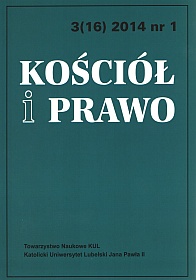The Principle of Legality in the Context of the General Norm in can. 1399 of the Code of Canon Law of 1983
Abstract
The principle of legality is one of the basic guarantees for the protection of human rights. The secular legislation is always put at absolutely. In canon law judge, in accor-dance with canon 1399, may punish by a just penalty the external violation of a divine or canonical law. Criminal sanction may be used only when the special gravity of the violation demands punishment and there is an urgent need to prevent or repair scandals. The principle of legality is difficult to justify only the natural law. The application of the general rule of canon 1399 bears the marks of discretion – whenever supervisor deems it appropriate. Supervisors, however, should not use it often. The principle of legality on the one hand can protect against abuses judge, on the other hand allows to punish crimes that remain unpunished. Superior has the ability to impose a just punishment, individualized in a particular case, adapted to the size of the crime and the offender guilty.
References
Arias Juan, Księga VI. Sankcje w Kościele, w: Kodeks Prawa Kanonicznego. Komentarz. Powszechne i partykularne ustawodawstwo Kościoła katolickiego. Podstawowe akty polskiego prawa wyznaniowego. Edycja polska na podstawie wydania hiszpańskiego, red. P. Majer, s. 983-1046.
Borek Dariusz, Uprawnienia i obowiązki ordynariusza w początkowej fazie wymiaru kar (kan. 1341-1342), Prawo Kanoniczne 50 (2007) ,nr 3-4, s. 255-290.
Calabrese Antonio, Diritto penale canonico, Roma 2006.
Chiappetta Luigi, Il Codice di Diritto Canonico. Commento giuridico-pastorale, t. II, Edizioni Dehoniale – Napoli 1988.
De Paolis Velasio, Cito Davide, Le sanzioni nella chiesa. Commento al Codice di Diritto Canonico. Libro VI, Roma 2000.
Gajda Piotr M., Sankcje w Kościele w świetle Kodeksu Prawa Kanonicznego Jana Pawła II oraz późniejszych zmian i uzupełnień. Studium kanoniczno-pastoralne, Tarnów 2008.
Grześkowiak Alicja, Zagadnienia ogólne, w: Prawo karne, red. A. Grześkowiak, Warszawa 2012, s. 3-57.
Krukowski Józef, Lempa Florian, Księga VI. Sankcje w Kościele, w: Komentarz do Kodeksu Prawa Kanonicznego z 1983 r., t. IV, red. W. Wójcik, J. Krukowski, F. Lempa, Lublin 1987, s. 111-280.
Pawluk Tadeusz, Prawo kanoniczne według Kodeksu Jana Pawła II, t. IV: Doczesne dobra Kościoła. Sankcje w Kościele. Procesy, Olsztyn 1990.
Przybyła Alfons, Zasada legalności w kościelnym prawie karnym, Prawo Kanoniczne 14 (1971), nr 1-2, s. 225-252.
Przytuła Franciszek, Zasada legalności a funkcjonowanie administracji kościelnej, Lublin 1985.
Stokłosa Marek, Utrata przynależności do stanu duchownego na podstawie specjalnych uprawnień przyznanych Kongregacji ds. Duchowieństwa, Prawo Kanoniczne 54 (2011), nr 1-2, s. 43-75.
Syryjczyk Jerzy, Kanoniczne prawo karne. Część szczególna, Warszawa 2003.
Copyright (c) 2014 Kościół i Prawo

This work is licensed under a Creative Commons Attribution-NonCommercial-NoDerivatives 4.0 International License.





